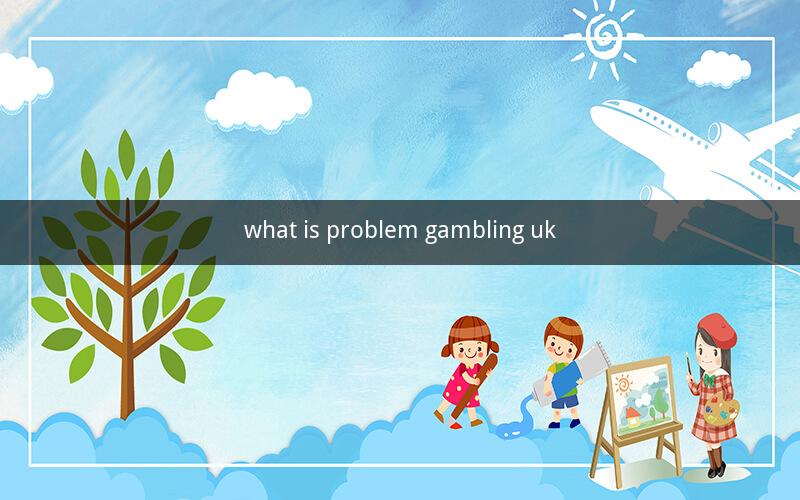
Table of Contents
1. Introduction to Problem Gambling
2. Definition and Prevalence of Problem Gambling in the UK
3. Risk Factors and Causes
4. Symptoms and Signs of Problem Gambling
5. Impact on Individuals and Society
6. Treatment and Support Options
7. Prevention and Awareness Campaigns
8. The Role of Technology in Problem Gambling
9. Legal and Regulatory Framework
10. Conclusion
1. Introduction to Problem Gambling
Problem gambling, often referred to as gambling addiction, is a condition where an individual's gambling habits become uncontrollable and detrimental to their personal, social, and financial well-being. In the United Kingdom, this issue has gained significant attention as it affects a growing number of individuals across various demographics.
2. Definition and Prevalence of Problem Gambling in the UK
Problem gambling is characterized by the inability to control gambling behaviors, despite negative consequences. In the UK, it is estimated that around 400,000 people are affected by problem gambling, with a further 1.6 million experiencing some form of gambling-related harm (Gambling Commission, 2020).
3. Risk Factors and Causes
Several factors contribute to the development of problem gambling, including:
- Psychological factors: Personality traits, such as impulsivity and sensation-seeking, can increase the risk of developing gambling problems.
- Social factors: Peer pressure, family environment, and cultural influences can also play a role in the development of gambling addiction.
- Environmental factors: Access to gambling opportunities, such as casinos and online platforms, can contribute to the problem.
4. Symptoms and Signs of Problem Gambling
Recognizing the signs of problem gambling is crucial for early intervention. Common symptoms include:
- Compulsive gambling behavior: A persistent urge to gamble, even when it causes harm.
- Loss of control: Inability to stop gambling, despite negative consequences.
- Time and money spent on gambling: Increasing amounts of time and money dedicated to gambling activities.
- Debt and financial problems: Difficulty in managing finances due to gambling debts.
5. Impact on Individuals and Society
The impact of problem gambling is far-reaching, affecting both individuals and society as a whole. Individuals may experience:
- Mental health issues: Depression, anxiety, and substance abuse disorders are common among problem gamblers.
- Physical health issues: Stress-related conditions, sleep disturbances, and other health problems can arise due to gambling addiction.
- Financial problems: Gambling debts can lead to financial ruin and bankruptcy.
Society also bears the brunt of problem gambling, with increased costs related to healthcare, criminal justice, and social services.
6. Treatment and Support Options
Treatment for problem gambling involves a combination of therapy, support groups, and self-help strategies. Common treatment approaches include:
- Cognitive-behavioral therapy (CBT): A type of therapy that helps individuals identify and change harmful thought patterns and behaviors.
- Motivational interviewing: A technique that helps individuals explore and resolve ambivalence about changing their gambling behaviors.
- Support groups: Groups such as Gamblers Anonymous provide peer support and resources for individuals struggling with gambling addiction.
7. Prevention and Awareness Campaigns
Prevention and awareness campaigns are essential in addressing the issue of problem gambling. In the UK, initiatives such as BeGambleAware and GamCare provide information and support to individuals and promote responsible gambling practices.
8. The Role of Technology in Problem Gambling
The rise of online gambling platforms has made it easier for individuals to access gambling opportunities, leading to an increase in problem gambling cases. Technology can also play a role in prevention and treatment, with apps and websites designed to help individuals monitor and manage their gambling behaviors.
9. Legal and Regulatory Framework
The UK government has implemented a legal and regulatory framework to address problem gambling. The Gambling Act 2005 provides a framework for regulating gambling in the UK, with the aim of ensuring fair and responsible gambling practices.
10. Conclusion
Problem gambling is a significant issue in the UK, affecting both individuals and society. By understanding the causes, symptoms, and treatment options, we can work towards a more informed and compassionate approach to addressing this problem.
---
Questions and Answers
1. What is the main difference between problem gambling and casual gambling?
- Problem gambling involves uncontrollable and harmful gambling behaviors, whereas casual gambling is occasional and does not cause significant harm.
2. Can problem gambling be treated effectively?
- Yes, problem gambling can be treated effectively with various therapeutic approaches and support options.
3. How can I recognize if someone is struggling with problem gambling?
- Look for signs such as secretive behavior, financial problems, and changes in mood or appearance.
4. What are some self-help strategies for managing gambling behaviors?
- Setting limits on gambling time and money, avoiding trigger situations, and seeking support from friends and family can be helpful.
5. Is online gambling more addictive than traditional gambling?
- Online gambling can be more addictive due to its convenience and accessibility, which may lead to increased exposure to gambling opportunities.
6. What role does social media play in promoting problem gambling?
- Social media can promote problem gambling by normalizing gambling behaviors and creating unrealistic expectations about winning.
7. How can parents help prevent their children from developing problem gambling?
- Parents can promote responsible gambling by discussing the risks and setting clear boundaries regarding gambling activities.
8. What is the most common age group affected by problem gambling?
- The most common age group affected by problem gambling is between 18 and 35 years old.
9. How can gambling addiction impact a person's relationships?
- Gambling addiction can lead to strained relationships, financial stress, and emotional turmoil, which can damage personal and professional relationships.
10. What is the most effective treatment for problem gambling?
- The most effective treatment for problem gambling is a combination of cognitive-behavioral therapy, support groups, and self-help strategies tailored to the individual's needs.